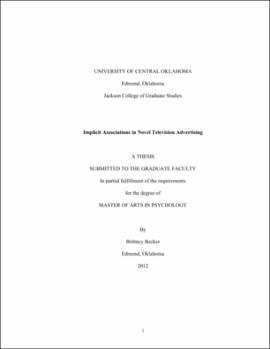| dc.contributor.advisor | Vanhoy, Mickie | |
| dc.contributor.author | Becker, Brittney | |
| dc.date.accessioned | 2020-05-26T20:39:06Z | |
| dc.date.available | 2020-05-26T20:39:06Z | |
| dc.date.issued | 2012 | |
| dc.identifier.other | (AlmaMMSId)9978590785202196 | |
| dc.identifier.uri | https://hdl.handle.net/11244/324694 | |
| dc.description.abstract | Advertising is a billion-dollar business, largely invested in television commercials. Although advertising in technology-based contexts such as Internet sites and digital video recording systems is increasing, television advertising remains in the top percentage of expenditures. The purpose of this investigation was to facilitate positive explicit and implicit attitudes toward featured products and services. The Implicit Association Test (IAT) is a putative measure of the robustness of non-conscious associations between concepts. In the IAT, participants categorize words or pictures as rapidly as possible. Concepts with compatible associations such as YOUNG=HAPPY produce faster and more accurate categorization times than concepts with incompatible associations such as YOUNG=DISASTER. Effective television commercials produce positive associations between the featured product and the concept GOOD, which should increase categorization times to associations such as PRODUCT=HAPPY and slow response times to associations such as PRODUCT=DISASTER. In the current study, undergraduates watched a television program embedded with foreign commercials before completing an IAT. The logos for products reappeared in the IAT (old products) with logos for new products. The hypothesis that positive associations were faster and more accurate for old products versus novel products was not supported.--Abstract. | |
| dc.rights | All rights reserved by the author, who has granted UCO Chambers Library the non-exclusive right to share this material in its online repositories. Contact UCO Chambers Library's Digital Initiatives Working Group at diwg@uco.edu for the permission policy on the use, reproduction or distribution of this material. | |
| dc.subject.lcsh | Television advertising | |
| dc.subject.lcsh | Attitude (Psychology) | |
| dc.title | Implicit associations in novel television advertising. | |
| dc.type | Academic theses | |
| dc.contributor.committeeMember | Hancock, Thomas | |
| dc.contributor.committeeMember | Mather, Robert | |
| dc.contributor.committeeMember | Osburn, Holly | |
| dc.identifier.oclc | (OCoLC)ocn841416540 | |
| uco.group | UCO - Graduate Works and Theses::UCO - Theses | |
| thesis.degree.grantor | Jackson College of Graduate Studies | |
